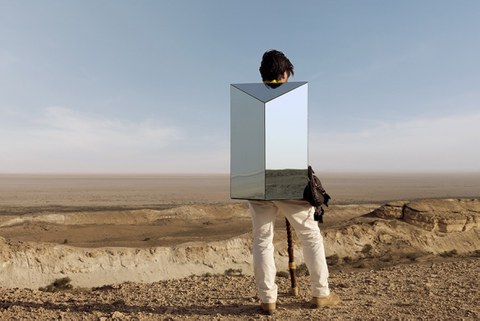Jun 29, 2020
The second artist in the residence programme at the Schaufler Lab@TU Dresden has been nominated: the New Yorker Anton Ginzburg

Anton Ginzburg: Video still ″Walking the Sea″, 2013
Artistic exploration in exchange with Schaufler Kolleg@TU Dresden fellows and scholars in the Cluster of Excellence Centre for Tactile Internet with Human-in-the-Loop (CeTI) and the National Competence Center for Artificial Intelligence (ScaDS.AI)
Starting in January 2021, the New York artist Anton Ginzburg will begin his six-month residency at TU Dresden as the second fellowship recipient in the Schaufler Lab@TU Dresden’s artist-in-residence programme. Ginzburg will follow the Viennese artist Christian Kosmas Mayer, who is the artist in residence at the Lab from September 2020 to February 2021. Together with early-career researchers at the Schaufler Kolleg@TU Dresden and through exchange with various university faculties, he will explore the lab’s first main research topic 'Artificial intelligence as factor and consequence of societal and cultural change'.
Anton Ginzburg‘s art encompasses a range of media: film, performance, sculpture, painting, and printmaking. The focus of his project at TU Dresden is an investigation of concepts of creativity and cultural labour in a historical context. Taking early modern methods of artistic practice and the legacy of 20th century modernist artistic vocabulary as a starting point, Ginzburg reflects on the current strategies of the technological mechanisation of work, such as machine learning, and their influence on contemporary artistic practices.
On his invitation to Dresden, Ginzburg writes: “The time at Schaufler Lab@TU Dresden as a scholar will be an essential experience for my development as an artist. It will initiate a dialogue between science and art, launch new work exploring themes of machine learning, and exchange ideas and practices with a new community of colleagues and public."
Anton Ginzburg, born 1974 in St. Petersburg, Russia, is a New York-based artist, who studied at The New School’s Parsons School of Design and at Bard College, New York. His work has been shown at the 54th Venice Biennale, the Blaffer Art Museum at the University of Houston, Palais de Tokyo in Paris, the San Francisco Museum of Modern Art, and at the first and second Moscow Biennales. Ginzburg’s films have been screened at the Whitechapel Gallery in London, Rotterdam International Film Festival (IFFR), Les Rencontres Internationales in Paris, Haus der Kulturen der Welt in Berlin, and at the New York Film Festival.
On the occasion of Anton Ginzburg’s nomination, Kirsten Vincenz, Schaufler Lab@TU Dresden spokesperson, remarked: “The Schaufler Residency@TU Dresden, anchored in the Office of Academic Heritage with its multifaceted cultural objects from the university’s instructional and academic collection, is the ideal place to explore and discuss the transformations of history, temporality and Artificial Intelligence in artistic research. In Ginzburg’s proposal, culture and technological history meets algorithms and pattern and facial recognition, which are investigated against the background of authoritarian systems.”
Ginzburg will present the work he completes during his residency in a final exhibition in the Altana Galerie in the Görges-Bau as well as in a combined show featuring all three residency artists in 2023 in SCHAUWERK Sindelfingen.
Schaufler Lab@TU Dresden
The Schaufler Lab@TU Dresden - a project of Technische Universität Dresden and THE SCHAUFLER FOUNDATION - is a lively forum for a forward-looking dialogue between science, art, and society. In line with TU Dresden's Excellence Strategy, the Lab serves as both platform and location for transdisciplinary research cooperation: artists and young researchers join across disciplinary boundaries to question current technologies, their origins, and their impact on our modern world.
The Schaufler Lab@TU Dresden is a logical and innovative enhancement of the existing transdisciplinary exhibition and communication format of the Art Science Labs of the TU Dresden's Academic Heritage. These labs, too, serve to explore the challenges of new technologies and the future of our society in an exchange between artistic and scientific practice.
The Schaufler Lab@TU Dresden enhances this idea by combining the residency with a graduate school for early-career researchers from the humanities and social sciences.
The residency enables artists to become part of the TU Dresden's scientific community for six months in order to jointly conduct research with scholars from various fields - both with the graduate students of the Schaufler Kolleg@TU Dresden and with scientists from the STEM subjects.
In the project's first funding phase from 2020 to 2022, the scholarship holders will explore the topic 'Artificial intelligence as factor and consequence of societal and cultural change'. The first doctoral students of the Schaufler Kolleg@TU Dresden has started their research in April 2020. In this first period, TU Dresden's Clusters of Excellence are the partners: the Centre for Tactile Internet with Human-in-the-Loop (CeTI), and the ScaDS.AI - Center for Scalable Data Analytics and Artificial Intelligence.
Weblinks:
Website of Schaufler Lab@TU Dresden: www.tu-dresden.de/gsw/schauflerlab
Information about the Schaufler Residency@TU Dresden: https://tu-dresden.de/gsw/schauflerlab/schaufler-residency
Artist´s Website: www.antonginzburg.com
1. Main Topic of Schaufler Lab@TU Dresden: https://tu-dresden.de/gsw/schauflerlab/einfuehrung/Leitthema_1
TU Dresden: www.tu-dresden.de
Office for Academic Heritage: www.tu-dresden.de/kustodie
THE SCHAUFLER FOUNDATION: www.the-schaufler-foundation.de
SCHAUWERK Sindelfingen: www.schauwerk-sindelfingen.de/de/
Media inquiries:
Lena Ludwig-Hartung
PR/Marketing SCHAUFLER LAB@TU DRESDEN
Office for Academic Heritage, Scientific and Art Collections
Tel.: 0351 463 44386
